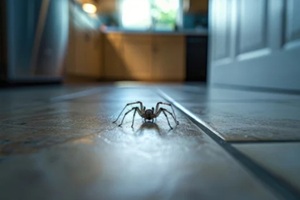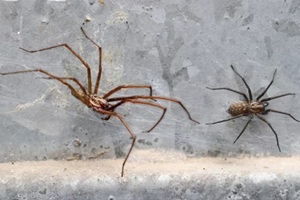 Spiders are a regular fact of life for many homeowners. Whether spinning their webs up in the corners of a room or wandering along countertops, it is common to encounter spiders. While most spiders are harmless and even beneficial for catching pests such as mosquitoes, some arachnids that make a home in residential buildings can pose a danger to the people and pets who live there.
Spiders are a regular fact of life for many homeowners. Whether spinning their webs up in the corners of a room or wandering along countertops, it is common to encounter spiders. While most spiders are harmless and even beneficial for catching pests such as mosquitoes, some arachnids that make a home in residential buildings can pose a danger to the people and pets who live there.
Being able to tell if the spiders in your home are dangerous is the first step in combating the potential risks that they pose. Thankfully, there are only two main types of spiders in the United States that are considered “dangerous” in a medical sense.
By learning how to identify them and what to do about their presence, homeowners can keep their private spaces safe without harming the beneficial insects that live near the residence.
Which Spiders Are Dangerous?
In America, there are two classes of spiders that can harm humans: Loxosceles spp. (brown spiders) and Latrodectus spp. (widow spiders). While there are about 12 spiders among these two groups that can cause a reaction in humans and pets, only two are considered medically significant enough that they may require a trip to the doctor.
Black widow
The black widow is one of the most iconic spiders. Its jet black, often shiny body contrasts with a red hourglass shape on its large, round abdomen. However, not all black widows have a vivid red shape on their bodies, and it’s often hard to get a good view of the underside of their abdomen. Consequently, some people misidentify these spiders.
Black widow spiders only bite when threatened, and only adult females can break human skin. These arachnids often occupy undisturbed outdoor spaces, such as wood piles, garages, and garbage bins. To avoid a bite, be cognizant of webs and try not to disturb or destroy them.
Brown recluse
As the name suggests, the brown recluse is a primarily brown spider with long legs compared to its body. While many sport the notorious violin-shaped black spot on its back (with the neck of the violin facing the head), young spiders may not wear it and instead feature only a slightly darker back section.
Many types of brown spiders live primarily in the southern section of the United States, but everyone should remain vigilant. These spiders are loners, so finding one does not necessarily indicate that there are others.
They prefer dark, warm spaces, so consider shoe boxes, rubber tires, furniture, closets, and corners of basements as areas of particular concern. Anywhere that remains undisturbed for long periods of time and provides a secure niche away from the light can serve as a good home for a brown recluse. Carefully examine such areas or items prior to placing your hand down.
What to Do If You’re Bitten
Both the black widow and brown recluse are venomous. Their bites are medically serious but rarely fatal. The people most at risk of negative outcomes or death are young children and the elderly, both of whom cannot process the venom as effectively.
A brown recluse bite may initially start as a painless bump, but it can quickly grow into a blister or pimple-looking growth at the site of the bite. The risk of a brown recluse’s bite is often less about the venom and more about what happens afterward.
The bite area can take a long time to heal, leaving the skin prone to infection and necrosis (decay and skin death). For this reason, brown recluse bites should be treated by a medical professional.
 Black widow bites tend to be the more painful of the two, at least at first. Shortly after the bite, the area typically becomes numb because the venom acts on the nerves in the surrounding tissue.
Black widow bites tend to be the more painful of the two, at least at first. Shortly after the bite, the area typically becomes numb because the venom acts on the nerves in the surrounding tissue.
The skin may turn gray or blue as oxygen is no longer properly transported to the blood vessels in the area due to nerve interference. Seek medical attention right away to address the effects of the bite.
Know How Your Spiders Are Helping or Harming
Spiders provide many valuable ecosystem services: pest control, food sources for other predators, and consumption of disease vectors such as ticks. However, some spiders can also pose a threat to humans.
While the majority of brown recluse and black widow spider bites are not fatal, it is still important to stay vigilant not to disturb them and to protect children, pets, and vulnerable or older adults from their bites.
The professionals at Spartan Animal & Pest Control can help you clear your home of problematic spiders and other pests so you can rest easy. Contact Spartan Animal & Pest Control to schedule a visit!



